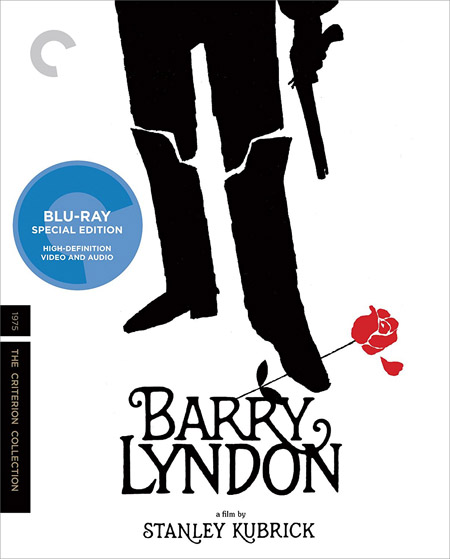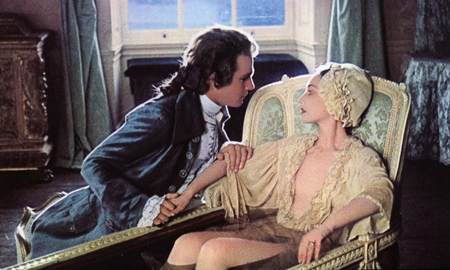
“THE BEAUTY OF IRONYâ€
By Raymond Benson
Leave
it to The Criterion Collection to present a jaw-dropping, eye-popping Blu-ray
release of Stanley Kubrick’s 1975 masterpiece that many critics have called one
of the most beautiful films ever made. While the picture received many
accolades upon its initial release, including Oscar nominations for Picture,
Director, Adapted Screenplay—and wins for Cinematography, Production Design,
Costumes, and Adapted Score—it was again one those Kubrick films that was
controversial and misunderstood at first. It was not a financial success in the
U.S., and yet today it’s considered one of the auteur’s greatest works.
After
such titles as Dr. Strangelove, 2001: A Space Odyssey, and A Clockwork Orange, it may have seemed
to be an odd choice for Kubrick to make a picture such as Barry Lyndon. One must look back to the period between 2001 and Clockwork to understand it. Kubrick had wanted to make an epic
movie about Napoleon and, in fact, spent two years in pre-production on it
before MGM got cold feet and pulled the plug. The director changed studios (to
Warner Brothers) and shot Clockwork cheaply
and quickly to prove that he could make them some money—and he did. So what was
he to do with all the previous research materials he had amassed for the
Napoleon project? He satisfied his desire to study the past by adapting an 18th
Century novel by William Makepeace Thackeray (The Luck of Barry Lyndon) so that he could tell a tale about class
dichotomy, ambition, greed, and hubris.
From
the beginning, Kubrick wanted to take an audience back to late 1770s England
and Ireland to demonstrate exactly what
it was like to live then. The authenticity he strove to achieve consisted of commissioning
a NASA lens so fast that it was capable of filming by candlelight (as well as utilizing
only natural light throughout the production), employing real clothing from the
period, and shooting at real locations where this past still existed. The
results are breathtakingly gorgeous renditions of English and Irish
countrysides and majestic, elegant manors. All of this surrounds the precise
depiction of the manners of an aristocracy that hasn’t been seen on screen
before or since.
Ryan
O’Neal, who was at the time of production still a box-office star, was cast as
Barry, at first a naïve Irish boy who allows heartbreak and jealousy to shape
his future endeavors to elevate his social standing. He learns quickly that to
get ahead in society he must be a bit of a rogue, a schemer, a liar, and a cad.
The first half of the little-over-three-hour picture documents Barry’s rise to
prominence. After the intermission, we witness his resounding fall from grace.
The
story is told with Kubrick’s keen sense of irony—in
fact, no other filmmaker has had such a firm ability to elicit this very
difficult blend of satire, causticness, and paradox. You find it in all of his
pictures, but Barry Lyndon literally exudes it. This is accomplished in no
small part by the detached and slightly amused voice-over narration by Michael
Hordern.
Yes,
the movie is slowly paced—as it should be. Things moved slower in the 1700s.
There is a stateliness and pageantry to the proceedings that is entirely
appropriate to the setting, but also to the overall message of the film—that
despite the airs one puts on to impress, underneath we’re all still human and
pretty much the same.

Every
aspect of the production is about as perfect as it can get. John Alcott’s
cinematography, Ken Adam’s production design, Milena Canonero and Ulla-Britt Söderlund’s
costumes, and the musical score, adapted by Leonard Rosenman and consisting of
classical pieces and traditional folk material performed by the Chieftains, all
combine to transport the viewer into an age of great beauty and yet cold,
near-heartless humanity.
The
Criterion Blu-ray is a 4K digital restoration that looks magnificent, and this
is accompanied by an uncompressed monaural soundtrack as well as an alternate
5.1 surround soundtrack. The music, as well as every birdsong and musket shot,
sounds clean, clear, and vibrant.
An
entire second disk contains the plentiful supplements that will take a few
hours to get through. The main attraction is “Making Barry Lyndon,†a new documentary that features audio excerpts from
a 1976 interview with Kubrick about the movie, appearances by executive
producer Jan Harlan, the director’s daughter Katharina Kubrick (who also
appears as an extra in the film), and other members from the cast and crew (no
Ryan O’Neal, though). There are separate featurettes on each of the technical
aspects—cinematography; production design; costumes; editing; music; and the
fine art of the period from which Kubrick and the designers drew inspiration.
An interview with author/critic Michael Ciment focuses on the themes in the
director’s works and how they relate to Lyndon.
There are two theatrical trailers. The thick booklet enclosed in the package contains
an essay by critic Geoffrey O’Brien and vintage, illustrated pieces from American Cinematographer.
In
short, Barry Lyndon is a remarkable
piece of cinema that is unfortunately underrated by the general public. It deserves
a spot alongside Stanley Kubrick’s other acknowledged “masterpieces.†The new
Criterion edition is just the way to see it and perhaps rediscover this
brilliant work of art.
CLICK HERE TO ORDER FROM AMAZON